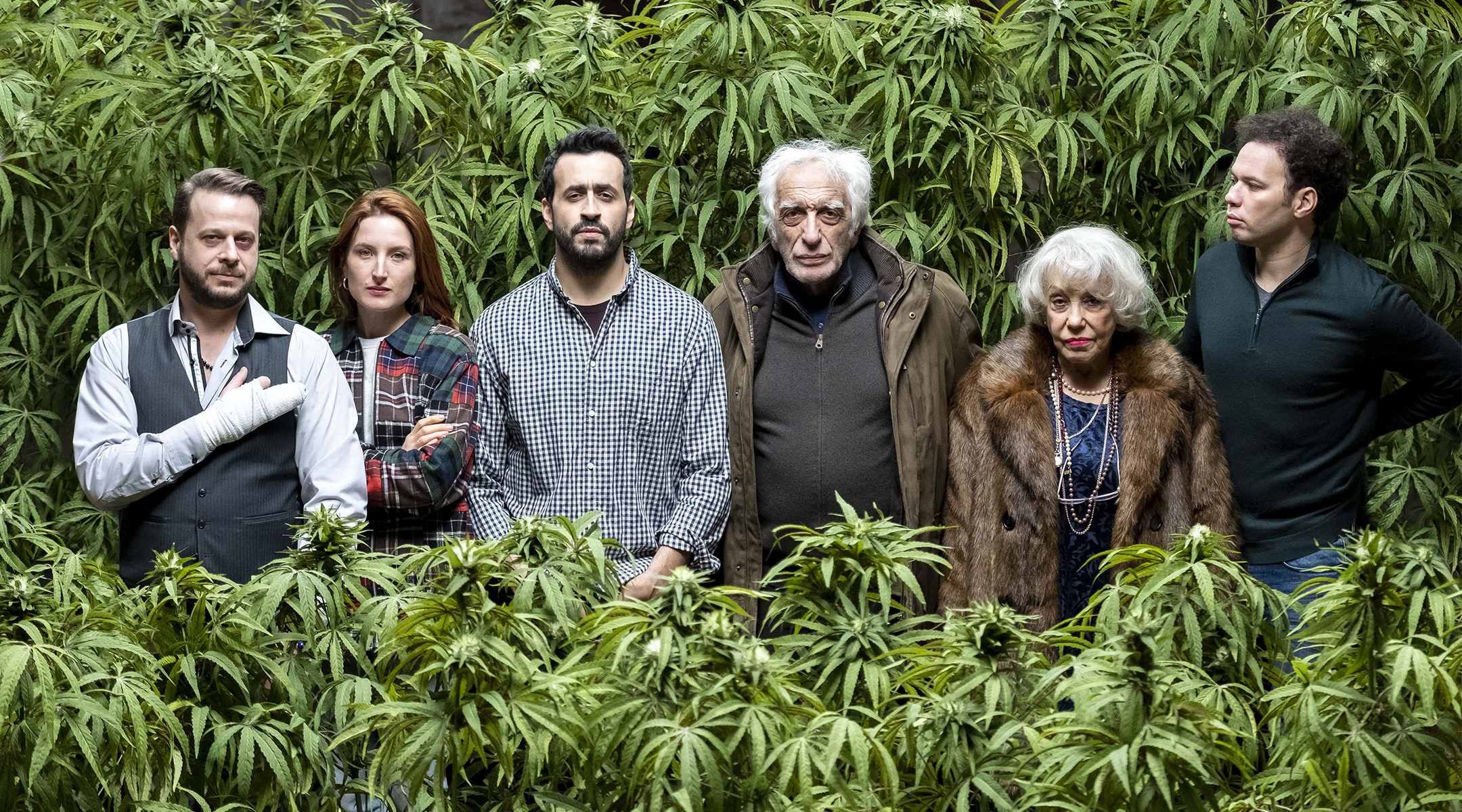(JTA) — One fan’s recent description on Twitter of the new Netflix series “Family Business” isn’t too far off: a “French Breaking Bad but with weed.”
The French series, which debuted last week, is a wacky comedy about a Parisian Jewish family, the Hazans, that turns its failed kosher meat shop into a marijuana factory. And while it lacks the macabre violence of “Breaking Bad,” the two shows do share a reliance on witty dialogue and strong acting.
Boasting a solid 7.3 score on IMDB, the series has wide appeal likely in large part to how it mixes race and family relations with fart jokes and surrealist scenes. (One features the Hazans narrowly avoiding arrest by telling police that the weed-stuffed dead pig in their kosher meat truck has been genetically engineered to receive rabbinical approval.)
For Jewish viewers in particular, the series has multiple hidden layers of meaning, and offers astute observations about Judaism’s ability to adapt and survive even when all seems lost — in France and beyond.
The decline of the Hazan family’s meat shop in the Marais district, for instance, echoes the real-life departure of Jews and their businesses from the area that once was the beating heart of French Jewry. Previously full of kosher restaurants, butcher shops and other Jewish-owned small businesses, the Marais has changed radically since the 1980s, becoming a bar hub and mecca for boutique fashion shoppers.
Instead of selling and packing up, the Hazans decide to stay and adapt, largely thanks to a web of lies and manipulations spun by the show’s main character, Joseph, a failed, smooth-talking startup entrepreneur played by the French-Jewish comedian Jonathan Cohen.
The daring plan, which involves growing $3 million worth of dope in time for planned legalization, is also partly born out of crisis in Joseph’s family. His Sephardic father is not adjusting well to the recent loss of Joseph’s Ashkenazi mother.
The fusion of Sephardic and Ashkenazi ancestry is celebrated in the family’s diet, which insiders will recognize both as an accurate reflection of reality in many French Jewish households and a tribute to one of the French Jewish community’s greatest achievements: Its ability to transcend the Ashkenazi-Sephardic divide.
In one scene, in which the Hazans find themselves serving food to an entire police precinct inside their illegal growth lab, the family dishes out typically Eastern European foods alongside North African mloukhiya stew. In another, Joseph’s father, Gerard, the Sephardic one, asks his Ashkenazi mother-in-law to cook kishke — or as he calls it “that awful stink of a dish” — to camouflage the scent of budding marijuana plants from the cops working next door.
The family’s trademark product — the parallel of Walter White’s blue ice in AMC’s “Breaking Bad” — is called “pastraweed,” a mashup of pastrami and weed.
Yiddish phrases like “bubbeleh” pepper the dialogue, along with North African Jewish slang like “ya rab” and “miskin.” The show’s intro features klezmer music.
Another inside joke is about one of French Jewry’s legendary figures, singer Enrico Macias, who at 81 delivers a hilarious and self-deprecating portrayal of himself as a cheap, slightly clueless and ultimately kindhearted geezer.
Between the lines, the show’s creator, Igor Gotesman, also used the family biography to build a sort of microcosm of French Jewry — from the liberal elements represented in Joseph’s lesbian sister, Aure, to the conservative ones, represented by Gerard.
The Jewish identity of the characters is omnipresent, especially in shots that include mezuzahs, menorahs and even the hamsa symbol, which dangles from the rearview mirror of the Hazans’ delivery truck. The attention to symbols is appropriate in a community where thousands of members insist on wearing Jewish jewelry and yarmulkes even though it exposes them to anti-Semitic attacks.
This aspect of reality, however — a rising anti-Semitism in the country that has led to the departure of about 30,000 French Jews to Israel over the past five years — is almost entirely missing from the series. There’s a single reference to the community’s security situation, and even then it’s in a scene where police blow up an important suitcase left by mistake by one of the main characters in front of the meat shop.
The series’ writers also didn’t seem to make much of an effort to explain why the Hazans — a well-to-do middle-class family with a country estate and children who attended universities — are very close to a blue-collar Muslim family in which one of the sons is an Uber driver and another is a drug dealer. Joseph lives with a Muslim woman from that family, and her brother is one of Joseph’s best friends.
Such relationships certainly exist in France. But they are rare, born out of unusual circumstances that the series does not attempt to explain and often strained in ways that it shies away from exploring.
Perhaps such treatment is too much to expect from a goofy summertime crime comedy. But in a country whose society is currently tearing at the seams over issues of race and class, “Family Business” ignores such issues at the expense of its relevance both to France’s Jews and the zeitgeist.
Still, “Family Business” has its meaningful moments. In one of the final scenes, Gerard, the family’s grumpy patriarch, offers Joseph a rare compliment that seems to encapsulate one of the main themes of Jewish history.
“I’m proud of you,” he tells Joseph. “You fall, time and time again. And each time you fall, you rise up again.”
JTA has documented Jewish history in real-time for over a century. Keep our journalism strong by joining us in supporting independent, award-winning reporting.






